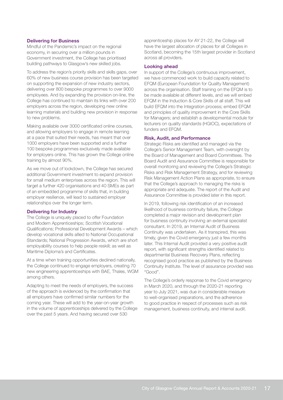
17
City of Glasgow College Annual Report & Accounts 2020-21
Delivering for Business
Mindful of the Pandemic's impact on the regional
economy, in securing over a million pounds in
Government investment, the College has prioritised
building pathways to Glasgow's new skilled jobs.
To address the region's priority skills and skills gaps, over
60% of new business course provision has been targeted
on supporting the expansion of new industry sectors,
delivering over 800 bespoke programmes to over 9000
employees. And by expanding the provision on-line, the
College has continued to maintain its links with over 200
employers across the region, developing new online
learning materials and building new provision in response
to new problems.
Making available over 3000 certificated online courses,
and allowing employers to engage in remote learning
at a pace that suited their needs, has meant that over
1000 employers have been supported and a further
100 bespoke programmes exclusively made available
for employers online. This has grown the College online
training by almost 90%.
As we move out of lockdown, the College has secured
additional Government investment to expand provision
for small medium enterprises across the region. This will
target a further 420 organisations and 40 SMEs as part
of an embedded programme of skills that, in building
employer resilience, will lead to sustained employer
relationships over the longer term.
Delivering for Industry
The College is uniquely placed to offer Foundation
and Modern Apprenticeships; Scottish Vocational
Qualifications; Professional Development Awards - which
develop vocational skills allied to National Occupational
Standards; National Progression Awards, which are short
employability courses to help people reskill; as well as
Maritime Diploma's and Certificates.
At a time when training opportunities declined nationally,
the College continued to engage employers, creating 70
new engineering apprenticeships with BAE, Thales, WGM
among others.
Adapting to meet the needs of employers, the success
of the approach is evidenced by the confirmation that
all employers have confirmed similar numbers for the
coming year. These will add to the year-on-year growth
in the volume of apprenticeships delivered by the College
over the past 5 years. And having secured over 530
apprenticeship places for AY 21-22, the College will
have the largest allocation of places for all Colleges in
Scotland, becoming the 15th largest provider in Scotland
across all providers.
Looking ahead
In support of the College's continuous improvement,
we have commenced work to build capacity related to
EFQM (European Foundation for Quality Management)
across the organisation. Staff training on the EFQM is to
be made available at different levels, and we will embed
EFQM in the Induction & Core Skills of all staff. This will
build EFQM into the Integration process; embed EFQM
and principles of quality improvement in the Core Skills
for Managers; and establish a developmental module for
lecturers on quality standards (HGIOC), expectations of
funders and EFQM.
Risk, Audit, and Performance
Strategic Risks are identified and managed via the
College's Senior Management Team, with oversight by
the Board of Management and Board Committees. The
Board Audit and Assurance Committee is responsible for
overall monitoring and reviewing the College's Strategic
Risks and Risk Management Strategy, and for reviewing
Risk Management Action Plans as appropriate, to ensure
that the College's approach to managing the risks is
appropriate and adequate. The report of the Audit and
Assurance Committee is provided later in this report.
In 2019, following risk identification of an increased
likelihood of business continuity failure, the College
completed a major revision and development plan
for business continuity involving an external specialist
consultant. In 2019, an Internal Audit of Business
Continuity was undertaken. As it transpired, this was
timely, given the Covid emergency just a few months
later. This Internal Audit provided a very positive audit
report, with significant strengths identified related to
departmental Business Recovery Plans, reflecting
recognised good practice as published by the Business
Continuity Institute. The level of assurance provided was
"Good".
The College's orderly response to the Covid emergency
in March 2020, and through the 2020-21 reporting
year to July 2021, was due in considerable measure
to well-organised preparations, and the adherence
to good practice in respect of processes such as risk
management, business continuity, and internal audit.